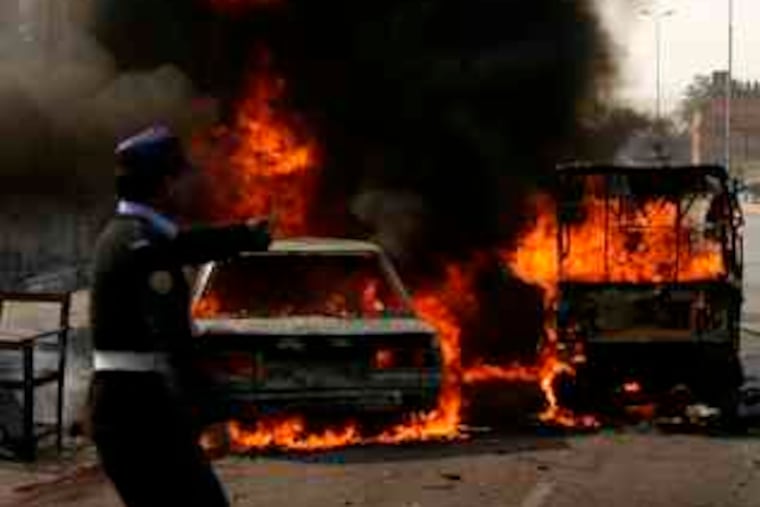46 killed in Pakistan blasts
LAHORE, Pakistan - Bombings in two Pakistan cities killed 46 people yesterday, as extremists struck back in the wake of an army offensive against a Taliban stronghold in the northwest near the Afghan border.

LAHORE, Pakistan - Bombings in two Pakistan cities killed 46 people yesterday, as extremists struck back in the wake of an army offensive against a Taliban stronghold in the northwest near the Afghan border.
Two synchronized bombs ripped through a market popular with women in the eastern Pakistani city of Lahore about 9 p.m., igniting a huge fire that killed 36 people, authorities said. Hours earlier, a suicide bomber killed 10 people outside a courthouse in the northwestern city of Peshawar.
About 100 people were wounded in the attacks in Lahore, which were timed to take place when the Moon Market was as its busiest. Authorities initially said both bombs were believed to be remote-controlled, but they later said a suicide bomber was suspected to have carried out at least one of them.
The blasts came within 30 seconds of each other, leaving dozens of cars and shops ablaze late into the night. Many victims were women and children.
By attacking Lahore, extremists are bringing their war to the heart of Pakistan. The city is the capital of Punjab, Pakistan's most populous province, and is considered the political and cultural center. It is also home to many army regiments because of its location next to the border with India, Pakistan's longtime foe.
Most of the extremist attacks in recent weeks have been directed at security forces, though several have targeted crowded public spaces like markets, apparently to create public anger and increase pressure on the government to call a halt to the offensive.
More than 400 people have been killed since the beginning of October, including 105 in a Peshawar market frequented by women. That attack occurred while U.S. Secretary of State Hillary Rodham Clinton was visiting Pakistan.
President Obama's newly announced plan for stabilizing Afghanistan relies heavily on Pakistan to act on its side of the border to help oust the Taliban and other unsurgents. An increase in bombings over the last few months and challenges to President Asif Ali Zardari have caused concern in the White House.
Zaardari and his government yesterday headed into new turmoil as the high court began its review of a legal amnesty for politicians and bureaucrats.
Should the court throw out the amnesty, old criminal charges could be revived against the interior and defense ministers, senior government officials and even Zardari. Surprisingly, the government failed to mount any defense of the law.
Although Zardari enjoys immunity as president, some lawyers contend the protection will not apply to allegations against him, mostly concerning alleged corruption, dating from the period long before he became president.
The case also opens the way for a court challenge to Zardari's eligibility to be president, in what appears to be a determined campaign by his political enemies to unseat him or severely weaken him.
That would not bode well for the Obama administration. The United States has invested considerable effort in building the relationship with Zardari and his civilian government, after backing a military regime in Pakistan until 2008, and any fight for power by Zardari could seriously hamper U.S. strategy in Afghanistan.
The lawsuit challenging the amnesty contends that it unfairly favors a small class of people, politicians, and bureaucrats, while the rest of the people of Pakistan have to fight out their cases out in the courts
"It is time to begin an operation to clean up Pakistan," said Mubashir Hasan, a former finance minister who brought the main petition, speaking outside the court. "The ruling class . . . should be swept away so that a new era can begin."
This article contains information from McClathcy Newspapers.